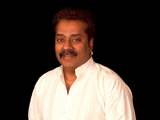| Interview : Hariharan - Reinventing Ghazal | |
Excerpts from an Interview: Why are you using the term 'Urdu Blues' to describe your album? Because it is precisely that! Blues is music that celebrates the highs and lows of life. I had coined this term for my album Kaash way back in 2000. This album is an extension of that. I love to mix musical genres. Jazz, classical Indian music, R & B in India - I like such amalgams. A ghazal is not just traditional but also basically a form of poetry rather than music. So how much of this modern treatment is about targeting the youth market and how much is conviction? I have always done what I wanted to do! On the other hand, I have always been youth-oriented right from Colonial Cousins over a decade ago. Yes, the youth is used to good sound and there is no point in making music to which no one will relate, because music is basically about communication. It's a language whose grammar changes every now and then.When I began to sing there was preference for shaayari and gaayaki. Today they want lighter poetry, but you can still give content ensuring that it does not jar or have a negative effect. We can communicate the same message by interacting in person, speaking on 'phone, email or SMS. But obviously our language will differ. As a musician, one must reinvent all the time.
You compose your own songs. What happens when the composer in you clashes with the singer? I think that over the years I have struck a better balance between the composer and singer in me. Earlier I had this'Sab gaa saktaa hoon' attitude because I had to prove myself and demonstrate my versatility. Now I am not hankering for that endorsement, so I sing as instructed by the composer within me! There has been a paradigm shift in music. What are the effects on you as an artiste? I now have to reserve the intricacies of pukhta gaayaki to the mehfils. Refined singing is not really endorsed anymore by the younger generation or even older people. Societal life is stressful today. People want flippant songs that they can enjoy. But I think that if Indian music has been relegated to the background it is not because of market-forces but because of our social structure and government. Abroad, it is compulsory to learn either vocal or instrumental music of that nation for each student. Here they are not even exposed to Indian music - that's the big change. Jab maa-baap hi Hindustani sangeet nahin sunte then what else can we expect? Yes, there is no harm in being exposed to Western music, but simultaneously they should be familiar with our gaayaki, our culture.
Frankly I have never been much into playback, though compared to my output I got several great songs, a few from the '80s to the mid-'90s, like 'Jhatpat ghoonghat khol' with Kishoreda in Sindoor, which was also fusion, and songs that I sang for Jaidevji, R.D.Burman and others. From my busiest phase from'96 to 2003, I could sing only 50% of the songs that were offered to to me because I was busy with my shows, with Colonial Cousins and my South Indian film assignments. Believe me, there was a time when I was singing 80% of the film songs down South! Even today, I am very lucky that most of my songs are hits, but they don't register as Hariharan hits for some weird reason (Laughs) - like 'Jhonka hawaa ka' (Yaadein), 'Khaali hai'(Paheli) or my song in Guru. I am now singing for Shankar-Ehsaan-Loy in Amol Palekar's new film, for Shamir Tandon in Bal Ganesh, for Bappa Lahiri in Dus Kahaaniyan and for A.R.Rahman in the dubbed Hindi version of Sivaji - The Boss. |
Copyright 2007 by MusicIndiaOnLine.com
Source:










comment:
p_commentcount